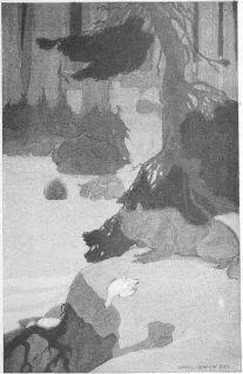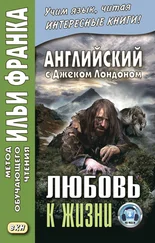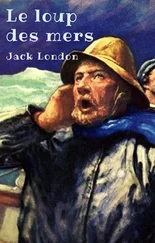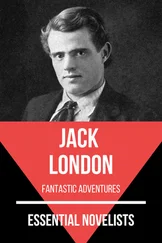Jack London - Love of Life
Здесь есть возможность читать онлайн «Jack London - Love of Life» весь текст электронной книги совершенно бесплатно (целиком полную версию без сокращений). В некоторых случаях можно слушать аудио, скачать через торрент в формате fb2 и присутствует краткое содержание. Жанр: Классическая проза, на английском языке. Описание произведения, (предисловие) а так же отзывы посетителей доступны на портале библиотеки ЛибКат.
- Название:Love of Life
- Автор:
- Жанр:
- Год:неизвестен
- ISBN:нет данных
- Рейтинг книги:4 / 5. Голосов: 1
-
Избранное:Добавить в избранное
- Отзывы:
-
Ваша оценка:
- 80
- 1
- 2
- 3
- 4
- 5
Love of Life: краткое содержание, описание и аннотация
Предлагаем к чтению аннотацию, описание, краткое содержание или предисловие (зависит от того, что написал сам автор книги «Love of Life»). Если вы не нашли необходимую информацию о книге — напишите в комментариях, мы постараемся отыскать её.
Love of Life — читать онлайн бесплатно полную книгу (весь текст) целиком
Ниже представлен текст книги, разбитый по страницам. Система сохранения места последней прочитанной страницы, позволяет с удобством читать онлайн бесплатно книгу «Love of Life», без необходимости каждый раз заново искать на чём Вы остановились. Поставьте закладку, и сможете в любой момент перейти на страницу, на которой закончили чтение.
Интервал:
Закладка:
They climbed a slight hill and came out into an open space among the trees. Here, circled solemnly about a barrel that stood on end in the snow, were Negook and Hadikwan, and all the Siwashes down to the babies and the dogs, come to see the way of the white man’s law. Near by was an open grave which Hans had burned into the frozen earth.
Dennin cast a practical eye over the preparations, noting the grave, the barrel, the thickness of the rope, and the diameter of the limb over which the rope was passed.
“Sure, an’ I couldn’t iv done better meself, Hans, if it’d been for you.”
He laughed loudly at his own sally, but Hans’s face was frozen into a sullen ghastliness that nothing less than the trump of doom could have broken. Also, Hans was feeling very sick. He had not realized the enormousness of the task of putting a fellow-man out of the world. Edith, on the other hand, had realized; but the realization did not make the task any easier. She was filled with doubt as to whether she could hold herself together long enough to finish it. She felt incessant impulses to scream, to shriek, to collapse into the snow, to put her hands over her eyes and turn and run blindly away, into the forest, anywhere, away. It was only by a supreme effort of soul that she was able to keep upright and go on and do what she had to do. And in the midst of it all she was grateful to Dennin for the way he helped her.
“Lind me a hand,” he said to Hans, with whose assistance he managed to mount the barrel.
He bent over so that Edith could adjust the rope about his neck. Then he stood upright while Hans drew the rope taut across the overhead branch.
“Michael Dennin, have you anything to say?” Edith asked in a clear voice that shook in spite of her.
Dennin shuffled his feet on the barrel, looked down bashfully like a man making his maiden speech, and cleared his throat.
“I’m glad it’s over with,” he said. “You’ve treated me like a Christian, an’ I’m thankin’ you hearty for your kindness.”
“Then may God receive you, a repentant sinner,” she said.
“Ay,” he answered, his deep voice as a response to her thin one, “may God receive me, a repentant sinner.”
“Good-by, Michael,” she cried, and her voice sounded desperate.
She threw her weight against the barrel, but it did not overturn.
“Hans! Quick! Help me!” she cried faintly.
She could feel her last strength going, and the barrel resisted her. Hans hurried to her, and the barrel went out from under Michael Dennin.
She turned her back, thrusting her fingers into her ears. Then she began to laugh, harshly, sharply, metallically; and Hans was shocked as he had not been shocked through the whole tragedy. Edith Nelson’s break-down had come. Even in her hysteria she knew it, and she was glad that she had been able to hold up under the strain until everything had been accomplished. She reeled toward Hans.
“Take me to the cabin, Hans,” she managed to articulate.
“And let me rest,” she added. “Just let me rest, and rest, and rest.”
With Hans’s arm around her, supporting her weight and directing her helpless steps, she went off across the snow. But the Indians remained solemnly to watch the working of the white man’s law that compelled a man to dance upon the air.
BROWN WOLF
She had delayed, because of the dew-wet grass, in order to put on her overshoes, and when she emerged from the house found her waiting husband absorbed in the wonder of a bursting almond-bud. She sent a questing glance across the tall grass and in and out among the orchard trees.
“Where’s Wolf?” she asked.
“He was here a moment ago.” Walt Irvine drew himself away with a jerk from the metaphysics and poetry of the organic miracle of blossom, and surveyed the landscape. “He was running a rabbit the last I saw of him.”
“Wolf! Wolf! Here Wolf!” she called, as they left the clearing and took the trail that led down through the waxen-belled manzanita jungle to the county road.
Irvine thrust between his lips the little finger of each hand and lent to her efforts a shrill whistling.
She covered her ears hastily and made a wry grimace.
“My! for a poet, delicately attuned and all the rest of it, you can make unlovely noises. My ear-drums are pierced. You outwhistle-”
“Orpheus.”
“I was about to say a street-arab,” she concluded severely.
“Poesy does not prevent one from being practical-at least it doesn’t prevent me . Mine is no futility of genius that can’t sell gems to the magazines.”
He assumed a mock extravagance, and went on:
“I am no attic singer, no ballroom warbler. And why? Because I am practical. Mine is no squalor of song that cannot transmute itself, with proper exchange value, into a flower-crowned cottage, a sweet mountain-meadow, a grove of redwoods, an orchard of thirty-seven trees, one long row of blackberries and two short rows of strawberries, to say nothing of a quarter of a mile of gurgling brook. I am a beauty-merchant, a trader in song, and I pursue utility, dear Madge. I sing a song, and thanks to the magazine editors I transmute my song into a waft of the west wind sighing through our redwoods, into a murmur of waters over mossy stones that sings back to me another song than the one I sang and yet the same song wonderfully-er-transmuted.”
“O that all your song-transmutations were as successful!” she laughed.
“Name one that wasn’t.”
“Those two beautiful sonnets that you transmuted into the cow that was accounted the worst milker in the township.”
“She was beautiful-” he began,
“But she didn’t give milk,” Madge interrupted.
“But she was beautiful, now, wasn’t she?” he insisted.
“And here’s where beauty and utility fall out,” was her reply. “And there’s the Wolf!”
From the thicket-covered hillside came a crashing of underbrush, and then, forty feet above them, on the edge of the sheer wall of rock, appeared a wolf’s head and shoulders. His braced fore paws dislodged a pebble, and with sharp-pricked ears and peering eyes he watched the fall of the pebble till it struck at their feet. Then he transferred his gaze and with open mouth laughed down at them.
“You Wolf, you!” and “You blessed Wolf!” the man and woman called out to him.
The ears flattened back and down at the sound, and the head seemed to snuggle under the caress of an invisible hand.
They watched him scramble backward into the thicket, then proceeded on their way. Several minutes later, rounding a turn in the trail where the descent was less precipitous, he joined them in the midst of a miniature avalanche of pebbles and loose soil. He was not demonstrative. A pat and a rub around the ears from the man, and a more prolonged caressing from the woman, and he was away down the trail in front of them, gliding effortlessly over the ground in true wolf fashion.
In build and coat and brush he was a huge timber-wolf; but the lie was given to his wolfhood by his color and marking. There the dog unmistakably advertised itself. No wolf was ever colored like him. He was brown, deep brown, red-brown, an orgy of browns. Back and shoulders were a warm brown that paled on the sides and underneath to a yellow that was dingy because of the brown that lingered in it. The white of the throat and paws and the spots over the eyes was dirty because of the persistent and ineradicable brown, while the eyes themselves were twin topazes, golden and brown.
The man and woman loved the dog very much; perhaps this was because it had been such a task to win his love. It had been no easy matter when he first drifted in mysteriously out of nowhere to their little mountain cottage. Footsore and famished, he had killed a rabbit under their very noses and under their very windows, and then crawled away and slept by the spring at the foot of the blackberry bushes. When Walt Irvine went down to inspect the intruder, he was snarled at for his pains, and Madge likewise was snarled at when she went down to present, as a peace-offering, a large pan of bread and milk.
Читать дальшеИнтервал:
Закладка:
Похожие книги на «Love of Life»
Представляем Вашему вниманию похожие книги на «Love of Life» списком для выбора. Мы отобрали схожую по названию и смыслу литературу в надежде предоставить читателям больше вариантов отыскать новые, интересные, ещё непрочитанные произведения.
Обсуждение, отзывы о книге «Love of Life» и просто собственные мнения читателей. Оставьте ваши комментарии, напишите, что Вы думаете о произведении, его смысле или главных героях. Укажите что конкретно понравилось, а что нет, и почему Вы так считаете.












